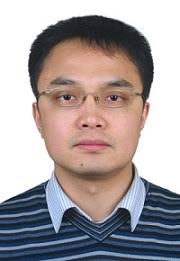Learning and Optimization for Next-Generation MIMO Communications
The Montreal Chapter of the IEEE Signal Processing Society, in collaboration with STARaCom, cordially invites you to attend the following talk to be given (in presence) at McGill University by Prof. Yunlong Cai, from Zhejiang University (Hangzhou, China).
Date and Time
Location
Hosts
Registration
-
 Add Event to Calendar
Add Event to Calendar
- 3480 University
- Montreal, Quebec
- Canada H3A 0E9
- Building: McConnell Engineering
- Room Number: 603
- Click here for Map
- Contact Event Hosts
-
Prof. Benoit Champagne, ECE Department, McGill University, Montreal
Co-sponsored by STARaCom
Speakers
 Prof. Yunlong Cai
Prof. Yunlong Cai
Learning and Optimization for Next-Generation MIMO Communications
Abstract: In this talk, I will introduce our recent work on effective beamforming design for massive multiuser MIMO and reconfigurable intelligent surface (RIS)-aided radar-communication coexistence (RCC) systems, respectively, via deep-unfolding and optimization techniques. In the first work, we propose a framework for deep-unfolding, where a general form of iterative algorithm induced deep-unfolding neural network (IAIDNN) is developed in matrix form to better solve the problems in communication systems. Then, we implement the proposed deep-unfolding framework to solve the sum rate maximization problem for beamforming design in massive multiuser MIMO systems. Specifically, the iterative algorithms are unfolded into a layer-wise structure, where a number of trainable parameters are introduced to replace the high complexity operations in the forward propagation. To train the network, a generalized chain rule of the IAIDNN is proposed to depict the recurrence relation of gradients between two adjacent layers in the back propagation. In the second work, we propose a double-RIS-assisted RCC system where two RISs are deployed for enhancing communication signals and suppressing mutual interference. We aim to jointly optimize the beamforming of RISs and radar to maximize communication performance while maintaining radar detection performance. The investigated problem is challenging, and thus we transform it into an equivalent but more tractable form by introducing auxiliary variables. Then, we propose a penalty dual decomposition (PDD)-based algorithm to solve the resultant problem. Simulation results verify the effectiveness of the proposed algorithms against the existing algorithms.
Biography:
Yunlong Cai received the Ph.D. degree in electronic engineering from the University of York, U.K., in 2010. From 2010 to 2011, he was a Postdoctoral fellow with the Electronics and Communications Laboratory, CNAM, France. Since February 2011, he has been with the College of Information Science and Electronic Engineering, Zhejiang University, Hangzhou, China, where he is currently a Professor. He has also held research visiting appointments at Georgia Institute of Technology and University of California Irvine. His research interests include transceiver design for multiple-antenna systems, cooperative and relay communications, UAV communications, and machine learning for communications. He has published over 200 journal and conference papers in these areas. Dr. Cai currently serves as an Associate Editor for IEEE Transactions on Communications and a Senior Area Editor for IEEE Signal Processing Letters. He is the Lead Guest Editor of the special issue on “Next Generation Advanced Transceiver Technologies” of the IEEE Journal on Selected Areas in Communications. He was an Associate Editor for IEEE Signal Processing Letters from 2018 to 2023. He has served as the General Chair for the eighteenth IEEE International Symposium on Wireless Communications Systems, which was held in Hangzhou, in October 2022. He regularly sits on the technical program committee boards of prominent IEEE conferences, such as ICC, GLOBECOM, and VTC.
Email:
Address:Zhejiang University, , Hangzhou, Canada

